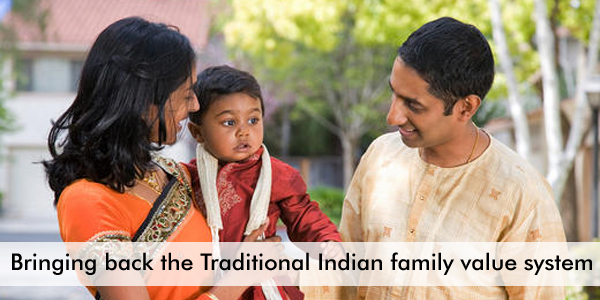
Parenting has been a constantly evolving process. Every subsequent generation has different ideas about parenting which, generally almost always, is frowned upon by the previous generation. Especially in India, where parents play an important role as advisors to their children about parenting, it is hard not to be influenced. But things are changing and young parents are finding their own methods and techniques.
Holi Hai! Happy Holi!

Holi, one of India’s most colourful and joyous festivals is coming soon! Holi will begin on the evening of March 1st when people gather around a fire and the spend the night sing, dancing & frolicking. The fire symbolises the death of the evil demon Holika who tries to kill Prahlad, a devotee of Vishnu. This is called Choti Holi or Holika Dahan. They also chant prayers and perform other rituals around the fire, to ward off evil, if any, inside them.
Traditional Indian Family Value System – Time to go Back to Basics?
Interesting that we should have selected this topic for discussion, in the first instance.
Are we thinking of ushering in the traditional value system because it is superior?
Or is it merely a tendency on the part of us humans to indulge in a bit of nostalgia now and then and look back at the good old days where everything was just about perfect?
 What exactly is the traditional Indian family value system?
What exactly is the traditional Indian family value system?
Indian culture has been heavily influenced by Dharmic (religions that originated in India) religions. The Indian value system has drawn its core philosophy from all Dharmic religions. The Abrahamic religions have also contributed significantly in shaping what is collectively known as the Indian Conscience, of which family life is a central theme.
The phrase Vasudhaiva Kutumbakam – the world is a family – owes its origins to ancient Indian texts:
One is a relative, the other stranger,
say the small minded.
The entire world is a family,
live the magnanimous.
The aspiration behind the verse is said to have inspired Mahatma Gandhi in giving shape to his own philosophy – respect for all life forms, non violence as a strategy to resolve conflicts and adoption of a holistic development model.
Makes perfect sense when you think about those needless conflicts and wars being waged largely on the basis of differences that are largely man-made, doesn’t it?
Family life, marriage, nature, agriculture and way of greeting people are at the heart of traditional Indian family system, and each of them contributing significantly to the overall system.
Let’s look at some of them in some detail.
- Greeting: When we meet people known and unknown, we greet them by pressing our hands together and bowing slightly, instead of shaking them by the hand. ‘Namaste’ means ‘I bow to you.’ This is seen as more respectful and being adopted by more and more people around the world, as it does not require physical contact and safeguards people against transfer of harmful germs.
- Marriage: Marriage is a sacred affair with primary emphasis on children and their upbringing. A shared responsibility always makes a marriage more stable. India’s divorce rates are still among the lowest in the world.
- Nature: Nature worship is an integral part of Indian family life, which ensured a healthy respect for nature and all living things. It also promoted sustainable living and inflicted minimal damage on the environment. Exactly what scientists are advocating now!
- Agriculture & Commerce: India has always been an agrarian society. We grew most our food ourselves and organically. In money matters, we have always been conservative with a marked emphasis on savings.
We have always believed in earning the money first before spending it.
Finally, our concept of family where everybody lives together under a single roof is largely responsible for establishing a solid value system.
- The traditional way is respect for elders, devotion to parents, and love for siblings.
- The reward is a stable family life full of security and love, and devoid of boredom.
Well, one could say, there is a lot going in favour of the traditional Indian family system.
You be the judge!